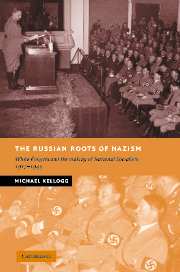Book contents
- Frontmatter
- Contents
- Acknowledgments
- List of abbreviations
- Introduction
- 1 The far right in the German and Russian Empires
- 2 At the extreme in the Ukraine and in Germany
- 3 “Hand in hand with Germany”
- 4 The international radical right's Aufbau (reconstruction)
- 5 “Germany–Russia above everything”
- 6 Conspiracies of fire and the sword
- 7 “In Quick March to the Abyss!”
- 8 The four writers of the apocalypse
- 9 Aufbau's legacy to National Socialism
- Conclusion
- Bibliography
- Index
- NEW STUDIES IN EUROPEAN HISTORY
- Frontmatter
- Contents
- Acknowledgments
- List of abbreviations
- Introduction
- 1 The far right in the German and Russian Empires
- 2 At the extreme in the Ukraine and in Germany
- 3 “Hand in hand with Germany”
- 4 The international radical right's Aufbau (reconstruction)
- 5 “Germany–Russia above everything”
- 6 Conspiracies of fire and the sword
- 7 “In Quick March to the Abyss!”
- 8 The four writers of the apocalypse
- 9 Aufbau's legacy to National Socialism
- Conclusion
- Bibliography
- Index
- NEW STUDIES IN EUROPEAN HISTORY
Summary
Historians should discard the notion of a linear German Sonderweg (special path) that led directly to Adolf Hitler's Third Reich. The American scholar Daniel Goldhagen in particular presents an overly simplistic version of the Sonderweg thesis in his book Hitler's Willing Executioners. He asserts, “The Holocaust was a sui generis event that has a historically specific explanation,” notably “enabling conditions created by the long-incubating, pervasive, virulent, racist, eliminationist antisemitism of German culture.” Instead of focusing solely on alleged German peculiarities in the vein of Goldhagen, historians should understand the genesis and development of National Socialism in the context of cross-cultural interaction between defeated groups from World War I and the Bolshevik Revolution: alienated völkisch (nationalist/racist) Germans and vengeful White émigrés. While the National Socialist movement largely developed in a völkisch framework, many White émigrés made crucial political, military, financial, and ideological contributions to National Socialism.
Hitler's National Socialist movement would not have arisen in the form it did without the twin upheavals of World War I and the Bolshevik Revolution. Far right movements in both the German and Russian Empires, while stronger in the latter than in the former, proved politically weak. Imperial German culture did develop coherent völkisch views with redemptive overtones. In particular, the philosopher Arthur Schopenhauer, the composer Richard Wagner, and the author Houston Stewart Chamberlain urged the German people to transcend the shallow materialism that they associated with the Jews and to attain redemption by negating the will to live.
- Type
- Chapter
- Information
- The Russian Roots of NazismWhite Émigrés and the Making of National Socialism, 1917–1945, pp. 272 - 280Publisher: Cambridge University PressPrint publication year: 2005

